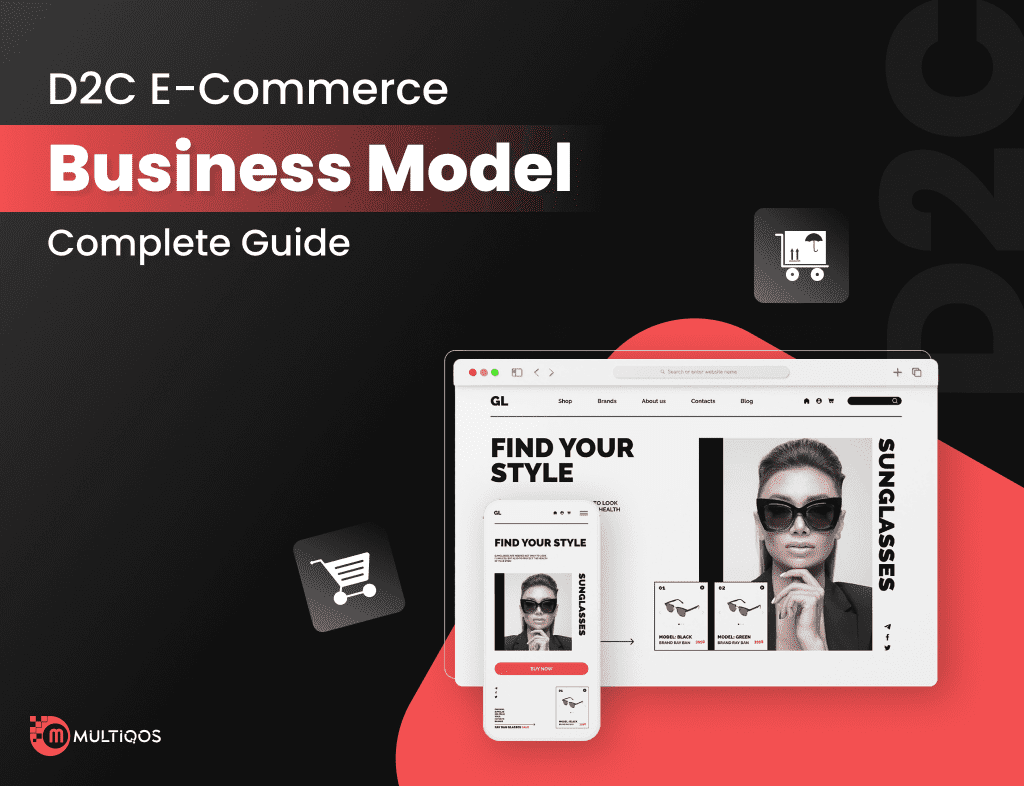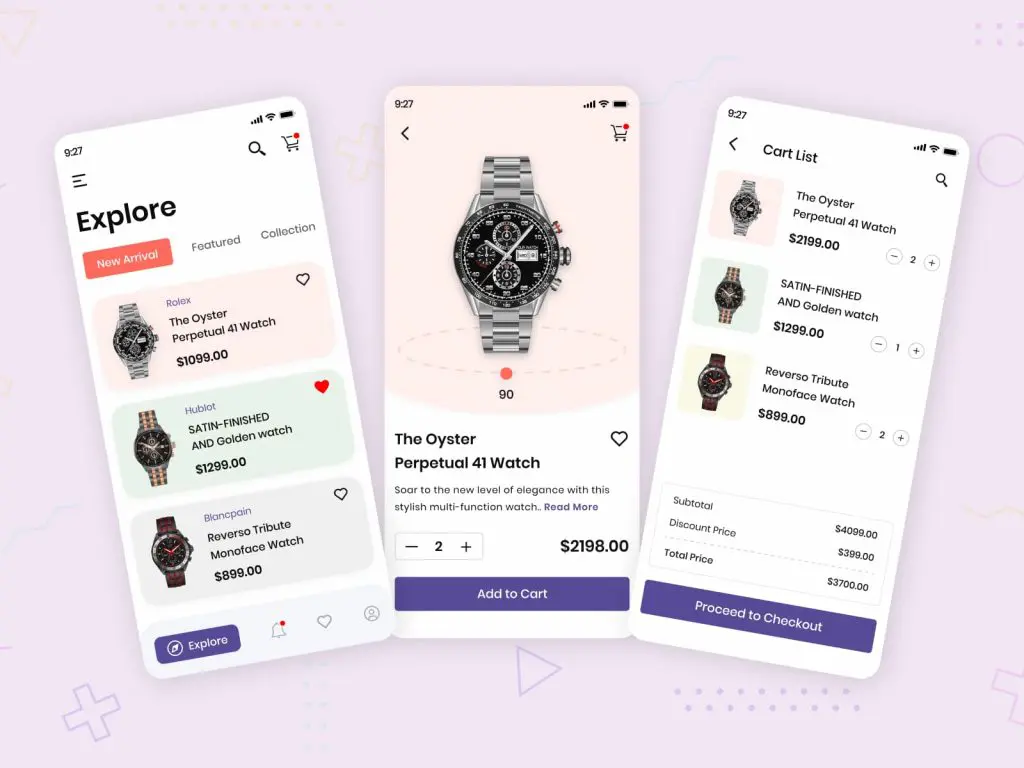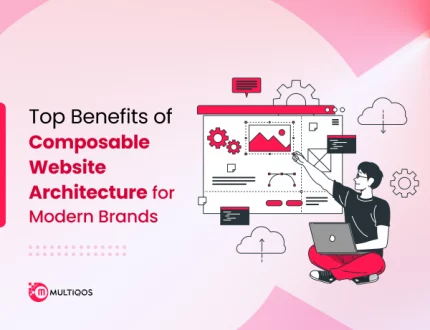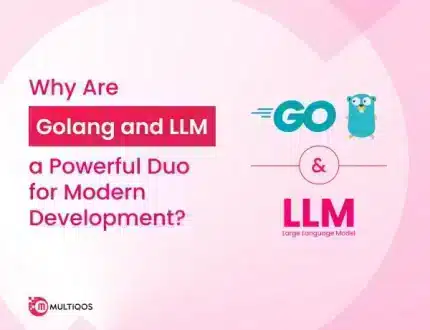What is D2C e-commerce Business Model: Detailed Guide

D2C (direct-to-customer) is popular right now. The most current statistics indicate that just 4% of millennials favour direct-to-consumer firms over traditional merchants. However, if you look at the numbers, this group represents a staggering 40–45% of the new generation. In other words, D2C sector is thriving as a result of this transition and digital transformation of Gen-purchasing Z’s behaviours.
Consumer habits have been shifting online since the pandemic ravaged the world, and a record 12,200 retail establishments shuttered in only one year. Brands who previously marketed their goods through conventional retail channels need to pay notice. This page goes into great detail on D2C, including all of its key features as well as the cost of development. So let us get started!
Overview of D2C E-commerce Website
A direct-to-consumer (D2C) e-commerce website is an online storefront where producers offer their goods to customers. A more conventional business moves from the producer via the wholesaler, distributor, retailer, and finally the customer. It takes significantly longer than D2C since the consumer receives the goods immediately from the producer in D2C.
Difference Between B2B Vs B2C Vs D2C Ecommerce
What distinguishes D2C from B2C is undoubtedly a question that everybody new to e-commerce has. But that is a valid query.
In essence, D2C firms don’t rely on “middlemen” sales channels or marketplaces like Amazon as B2C companies do. Every transaction and interaction in a D2C relationship solely includes a brand and its clients.
How are these D2C businesses doing?
According to recent data, 55% of consumers prefer to buy their favorite brands directly rather than through merchants. Digital D2C purchasers are anticipated to cross 100 million for the first time this year.
However, given that Amazon still accounts for over 60% of all online product searches, every ambitious direct-to-consumer firm must keep the e-commerce behemoths in mind as it develops its future strategy. However, two out of every five Americans think they would purchase from direct-to-consumer firms in the upcoming years, thus the chances will exist.
D2C offers several advantages over B2C, chief among them the ability it allows marketers to shape the consumer experience. Experiences will be the foundation of e-commerce in the future, and you, and not a third party, can control the finest experiences.
Key Features of a D2C Website
Now that you know about D2C, it is time to learn about the key features of a D2C website that make it stand out of the rest.
-
Easy Navigation and Better Designing
Aesthetics is important! Your essence must be distinctive to advance and flourish in the fierce competition that is business. A high-quality website is now very significant since it has value in the modern digital environment. D2C websites provides you the option to manage how your business is presented. But there is also a requirement for easy access and utilization in addition to a nice appearance. A D2C ecommerce website development should, of course, be simple to navigate.
Since nearly half of website traffic originates from mobile devices, the website also needs to be adaptable enough to fit in all displays. Scaling is still another important factor. In addition, a strong eCommerce website should let the algorithms do their magic since this increases customer engagement. The shopping cart, which enables the user to save items for later purchases, is yet another crucial component of the design. Keep everything hassle-free, including the checkout, payment gateways, refunds, etc. In addition, the primary goal of sign-up should be quick and secure.
Source: Online Watch Store App
-
Bound with Physical Retail
When a customer is purchasing online, one of the things on his or her attention is if they can physically find the supplied item in the closest store. A decent D2C platform need to provide a feature that lets consumers locate local merchants that have geo-located the item. The brands must be able to integrate and combine the online and offline platforms. In turn, the sales association will gain authority.
Take OVS as an illustration; this Italian retailer has introduced a number of technologies to make it easier for customers to locate the clothing of their choice offline. The interactive displays they have in-store truly take the shopping experience to a whole new level. Additionally, it allows for pink UPS online buying from more than 500 different businesses.
-
Advanced Security Features
Since the majority of direct-to-consumer (D2C) ecommerce websites operate on that premise in addition to one-tap payments, it is certain that someone who shops online will run into a circumstance where they need to pay using their credit or debit card. Although other people might utilize programs or technologies like PayPal.
Customers may link their store accounts with personal social network profiles on a lot of D2C websites. Whatever type of account is linked, it must all be secure. When creating a website, this investment is a “do must.” Networks are a need, as are numerous certifications and modern security.
D2C Ecommerce Platform Costing
When considering the price and budgeting for the upkeep of a D2C ecommerce website, several questions come to mind. However, because it depends on a number of different aspects, the factors are the response to your inquiries.
One must be exact and break down different components of the D2C eCommerce website he wants to construct in order to obtain a precise and accurate pricing. To get an exact cost, one must evaluate the requirements and requirements.
-
Breakdown of Cost
The size of your website has a big impact on the cost breakdown. SaaS d2c e-commerce market size solutions are an option for reducing functionality expenses. These tools help you save both time and money. Nevertheless, if you want your company to stand out, they aren’t the best option. Selecting customization will allow you to overcome this circumstance. When customization is at work, there is no upper bound.
Now that that is taken care of, let’s quickly go through the many factors that affect a D2C ecommerce website’s pricing.
-
Design
Design has the power to differentiate you from the competition, which will increase sales. For designing, there are both free and paid platforms available. Although free systems like Shopify may provide a good selection of themes, the cookie-cutter nature will always make it inadequate. Paid themes are quite customizable, so they may be elevated and given a more unique touch. The price of the custom development depends on how engaging you want your UX to be.
-
Functionality
A D2C ecommerce website needs have some fundamental features in order to operate, such as real-time product administration, a shopping cart, payment modules, etc. If you add plug-ins and add-ons to your website to enhance its functionality, you may discover both free and commercial add-ons. To create specialized add-ons for your website, you can hire mobile app developers. Given the moderate to sophisticated kind, the cost of customization ranges from $6,000 to $20,000 plus or less.
-
Fulfilment:
One must ensure that the physical and online ends of their D2C website are connected if they want to operate a successful ecommerce business. You’ll need fulfilment software for this since it can gracefully manage adjustments, provide notifications, communicate with delivery partners, and produce flawless bills. And they are but a handful of its objectives. Either purchase general-purpose fulfilment software or have one specially made for you. The typical monthly subscription charge for this software is in the $30 to $400 range. Even while some fulfilment software requires a one-time payment, that sum can reach $5,000.
-
Marketing:
You must take action in addition to the wonderful built-Run an advertising effort to get customers. To gain traction, you’ll need copywriting and SEO. Depending on how many pages you purchase, copywriting is more like a one-time investment, whereas SEO continues for as long as the website is up. The price of d2c marketing and copywriting for small- and medium-sized businesses can range from $500 to $2,000 and from $4,000 to $5,000.
- Maintenance:
For a D2C eCommerce website to function effectively, maintenance is necessary. This covers audits and upgrades. In addition to technical assistance, the shop has to be maintained so that problems and glitches are fixed and customer service is good. This might cost a small firm anything from $500 to $1,300. On the other hand, if it’s a big deal, it may cost up to $1,000.
Also Read: What is the Difference Between B2B and B2C Mobile Apps
MultiQoS Expertise
Although the direct-to-consumer market has its share of dangers and difficulties, the brands who succeed will do well in the years to come. Companies need to start developing a D2C strategy framework since Gen-Z is flocked to D2C brands. MultiQoS is a reputable E-commerce development company in USA that can assist you in creating a website for your business that will endure the test of time.
Conclusion
A key element is the digital revolution, which offers businesses reliable options like mobile applications to communicate with customers directly. Companies promote their products where their consumers are via paid advertising, email marketing, SEO techniques, and of course social media marketing.
D2C innovates brand management, sales, and growth while also getting rid of intermediaries from the supply chain. Additionally, being in close contact with customers enables companies to provide better experiences.
Want to Build Your Own eCommerce Store?
Let's start building your online store! Send us an idea or request a free consultation.
FAQs on D2C Business Model
Using chatbots and AI-powered assistants, conversational commerce is a type of online shopping in which customers and companies communicate to learn more about each other’s products, make purchases, and get services. It enables direct-to-consumer (D2C) and e-commerce firms to offer quick, customized experiences that customers may value more and that foster a sense of connection with the company.
For D2C and e-commerce firms, the conversational ecommerce development solutions include lead generation on social media platforms, retention marketing, customer buying patterns analysis, quick customer onboarding, cross-selling, and superior customer service. Conversion rates have improved, sales have increased, and total customer call volumes have decreased for businesses using conversational commerce.
Yes, the social chatbot can assist you in keeping track of client feedback on your social media platforms and engaging with those who provide it promptly. The chatbot monitors the main social media platforms and is activated whenever one of your consumers mentions, comments on, or tags your brand or brand page.
Get In Touch





